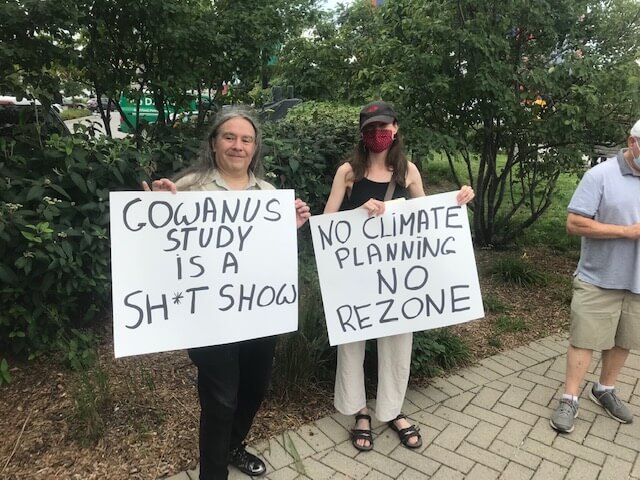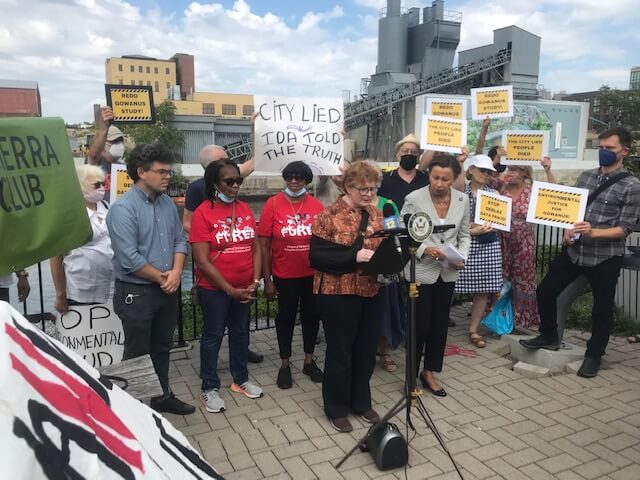Congresswoman Nydia Velazquez and Assembly member Jo Anne Simon spoke to a frustrated crowd of people in the Whole Foods parking lot next to the Gowanus Canal.
They both voiced their concerns about the city’s Gowanus rezoning plan which was approved by Mayor Bill de Blasio.
The rezoning plan would allow real estate developers to build new condos in the neighborhood, which is home to a Superfund site and just experienced horrendous flooding during Hurricane Ida, with many homeowners reporting raw sewage in their basements. One of the issues with the rezoning plan is that the city’s Draft Environmental Impact Statement (DEIS), which is used to justify rezonings, uses questionable data.
“The city claims that the rezoning will not increase CSO [combined sewer overflow] loading, however, the EPA points out that the city relies on 2008 rainfall data when more recent data is available,” Velazquez said. “When it comes to the Gowanus rezoning, the City’s environmental impact statement is wrought with inconsistencies and contradictions, as pointed out by the EPA and many groups. And most importantly, it does not properly take into consideration the impacts of climate change on the Gowanus community and on the ongoing cleanup of the Gowanus Canal.”
This is not a new situation for Velazquez. It was largely due to her influence that the federal EPA committed to the canal cleanup. At the time, she had to fight the Bloomberg administration, who thought the cleanup unnecessary, for much of the same reason as the city is a thornin the side of the Superfund today—that it will delay Gowanus real estate development, who couldn’t wait to put skyscrapers in the working class community between newly rich Park Slope and Carroll Gardens.
“The de Blasio administration has known for a long time about more recent data and has ignored it,” said Maureen Koetz, an environmental lawyer who has worked with members of Voice of Gowanus, a coalition of community organizations that oppose the Gowanus rezoning plan. “This is leaning towards fraud. The way to combat this is by continuing to bring attention to these issues and to write about them until we see results.”
Other people in attendance criticized Council Member Brad Lander and Borough President Eric Adams for supporting the rezoning without calling for better studies and improved infrastructure to protect the people living in Gowanus.
Adams is a favorite to win the NYC mayoral Election in November but when asked about him, Velazquez said that she is focused on working with the de Blasio administration for now. She also praised locals and activists for bringing attention to the issues with the City’s DEIS and for standing up for Gowanus.
Both Velazquez and Simon called for changes in sewage infrastructure to help protect the the community. Heavy rains cause sewage to overflow into the canal, with hurricanes bringing sewage into basements.

“These storms overwhelm our systems,” Simon said. “We have a sewer system that is working as it was designed to work a hundred years ago when we did not have nearly as many people here. We have to make changes to our infrastructure. It’s not sexy. It’s not fun. It doesn’t look pretty in pictures, but we are going to all drown and our health and safety is going to be irreparably compromised if we don’t do that work now.”
If the words of local politicians and residents of Gowanus did not bring attention to the issue, Hurricane Ida has. There were floods all over the neighborhood including sewage overflows. The new residents following a rezoning will mean more sewage, and climate change makes it likely that rainfall will continue to increase. Given what was seen following Ida, these are real issues.
“This is an issue of environmental justice,” Velazquez said. “It’s about protecting human life and for me, this is personal.”
Leaders also spoke about some of the broader environmental issues the community will have to deal with in coming years.
“Putting air, land, and water as an asset is where we must start because once they’re recognized as assets, people will stop exploiting them,” Koetz said.
While groups like Voice of Gowanus have been trying for years to bring attention to problems the Gowanus rezoning could cause, the devastation caused by Hurricane Ida has proven that these issues can no longer be ignored.
“There’s still a long way to go but this was a very positive day,” said Brad Vogel of Voice of Gowanus.
“I’m glad there are politicians and not just community members calling out the issues with the city’s DEIS and rezoning plan.”









